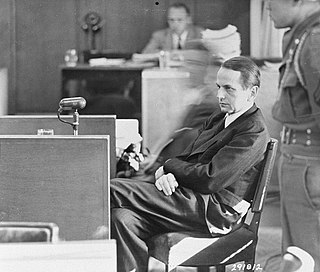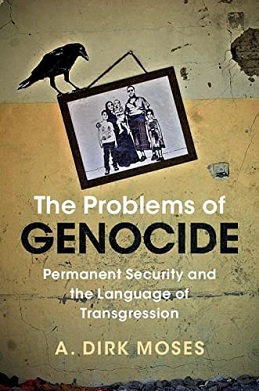Related Research Articles

Genocide is the intentional destruction of a people in whole or in part.

Raphael Lemkin was a Polish lawyer of Jewish descent who is known for coining the term genocide and campaigning to establish the Genocide Convention. During the Second World War, he campaigned vigorously to raise international outrage against atrocities in Axis-occupied Europe. It was during this time that Lemkin coined the term "genocide" to describe Nazi Germany's extermination policies against Jews and Poles.

The Herero and Nama genocide was a campaign of ethnic extermination and collective punishment which was waged against the Herero (Ovaherero) and the Nama in German South West Africa by the German Empire. It was the first genocide to begin in the 20th century, occurring between 1904 and 1908.

Guenter Lewy is a German-born American author and political scientist who is a professor emeritus of political science at the University of Massachusetts Amherst. His works span several topics, but he is most often associated with his 1978 book on the Vietnam War, America in Vietnam, and several controversial works that deal with the applicability of the term genocide to various historical events, where Lewy denies both the Romani genocide and the Armenian genocide.
Henry Egon Friedlander was a German-American Jewish historian of the Holocaust who was noted for his arguments in favor of broadening the scope of casualties of the Holocaust.
Settler society is a theoretical term in the early modern period and modern history that describes a common link between modern, predominantly European, attempts to permanently settle in other areas of the world. It is used to distinguish settler colonies from resource extraction colonies. The term came to wide use in the 1970s as part of the discourse on decolonization, particularly to describe older colonial units.
The assertion that the Holocaust was a unique event in human history was important to the historiography of the Holocaust, but it has come under increasing criticism in the twenty-first century. Related claims include the claim that the Holocaust is external to history, beyond human understanding, a civilizational rupture, and something that should not be compared to other historical events. Uniqueness approaches to the Holocaust also coincide with the view that antisemitism is not another form of racism and prejudice but is eternal and teleologically culminates in the Holocaust, a frame that is preferred by proponents of Zionist narratives.
The genocide of Indigenous peoples, colonial genocide, or settler genocide is the intentional elimination of Indigenous peoples as a part of the process of colonialism.
Racism in Poland in the 20th and 21st centuries has been a subject of extensive study. Ethnic minorities made up a greater proportion of the country's population from the founding of the Polish state through the Second Polish Republic than in the 21st century, when government statistics show 94% or more of the population self-reporting as ethnically Polish.

Genocidal rape, a form of wartime sexual violence, is the action of a group which has carried out acts of mass rape and gang rapes, against its enemy during wartime as part of a genocidal campaign. During the Armenian Genocide, the Greek genocide, the Assyrian genocide, the second Sino-Japanese war, the Holocaust, the Bangladesh Liberation War, the Bosnian War, the Rwandan genocide, the Congolese conflicts, the South Sudanese Civil War, the Yazidi Genocide, Rohingya genocide, the mass rapes that had been an integral part of those conflicts brought the concept of genocidal rape to international prominence. Although war rape has been a recurrent feature in conflicts throughout human history, it has usually been looked upon as a by-product of conflict and not an integral part of military policy.
Racial century is a term that has been used by historians to refer to the century between 1850 and 1950, especially in the context of postcolonial studies. The term employs race and racism as the primary category of analysis of global, national, and local affairs.

Genocide studies is an academic field of study that researches genocide. Genocide became a field of study in the mid-1940s, with the work of Raphael Lemkin, who coined genocide and started genocide research, and its primary subjects were the Armenian genocide and the Holocaust; the Holocaust was the primary subject matter of genocide studies, starting off as a side field of Holocaust studies, and the field received an extra impetus in the 1990s, when the Rwandan genocide occurred. It received further attraction in the 2010s through the formation of a gender field.

Genocide justification is the claim that a genocide is morally excusable/defensible, necessary, and/or sanctioned by law. Genocide justification differs from genocide denial, which is the attempt to reject the occurrence of genocide. Perpetrators often claim that genocide victims presented a serious threat, justifying their actions by stating it was legitimate self-defense of a nation or state. According to modern international criminal law, there can be no excuse for genocide. Genocide is often camouflaged as military activity against combatants, and the distinction between denial and justification is often blurred.

The connection between colonialism and genocide has been explored in academic research. According to historian Patrick Wolfe, "[t]he question of genocide is never far from discussions of settler colonialism." Historians have commented that although colonialism does not necessarily directly involve genocide, research suggests that the two share a connection.

Genocide is the deliberate and systematic destruction, in whole or in part, of an ethnic, racial, religious, or national group. The term was coined in 1944 by Raphael Lemkin. It is defined in Article 2 of the Convention on the Prevention and Punishment of the Crime of Genocide (CPPCG) of 1948 as "any of the following acts committed with intent to destroy, in whole or in part, a national, ethnical, racial, or religious group, as such: killing members of the group; causing serious bodily or mental harm to members of the group; deliberately inflicting on the group's conditions of life, calculated to bring about its physical destruction in whole or in part; imposing measures intended to prevent births within the group; [and] forcibly transferring children of the group to another group."

The Problems of Genocide: Permanent Security and the Language of Transgression is a 2021 book by Australian historian A. Dirk Moses. The book explores what Moses sees as flaws in the concept of genocide, which he argues allows killings of civilians that do not resemble the Holocaust to be ignored. Moses proposes "permanent security" as an alternative to the concept of genocide. The book was described as important, but his emphasis on security is considered only one factor to be causing mass violence.
In discussions of the Israeli–Palestinian conflict, the Holocaust and the Nakba have come to be regarded as interrelated events, both historically and in the way these two tragedies have influenced perceptions of the conflict by both parties. In Israel, all Israeli Jews are considered survivors of the Holocaust who must implement the imperative of never again in regards to being a Jewish victim. The uniqueness of the Holocaust is emphasized and any linkage between the Holocaust and the Nakba is rejected. The 2018 book The Holocaust and the Nakba argues that "unless we can hold these two moments in our hearts and minds as part of the same story, there can be no moving forward in the seemingly unmovable conflict that is Israel-Palestine".
This is a select annotated bibliography of scholarly English language books and journal articles about the subject of genocide studies; for bibliographies of genocidal acts or events, please see the See also section for individual articles. A brief selection of English translations of primary sources is included for items related to the development of genocide studies. Book entries may have references to journal articles and reviews as annotations. Additional bibliographies can be found in many of the book-length works listed below; see Further Reading for several book and chapter-length bibliographies. The External links section contains entries for publicly available materials on the development of genocide studies.

The genocide of Indigenous Australians refers to the systematic and deliberate actions taken primarily by European colonisers and their descendants, particularly during the 18th to the 20th centuries, aimed at eradicating Aboriginal and Torres Strait Islander cultures, languages, and people. Motivations for the genocide varied, and included motivations aimed at preserving a "white Australia", or assimilating Indigenous populations "for their own good".
References
- ↑ Moses, Anthony Dirk (2000). The Forty-fivers: The Languages of Republicanism and the Foundation of West Germany, 1945–1977 (PhD thesis). Berkeley, California: University of California, Berkeley. OCLC 47068134.
- ↑ "A. Dirk Moses". The City College of New York. 25 July 2022. Retrieved 11 August 2022.
- ↑ "A. Dirk Moses Faculty Page". UNC History Department. Archived from the original on 5 August 2020. Retrieved 21 July 2020.
- ↑ Moses, A. Dirk (2021). The problems of genocide : permanent security and the language of transgression. Cambridge University Press. ISBN 978-1-316-21730-6. OCLC 1159607278.
- ↑ Anne Fuchs, Jonathan James Long, W.G. Sebald and the Writing of History, p. 110, Königshausen & Neumann, 2007. The term is used in an essay Moses published in 2002: “Conceptual Blockages and Definitional Dilemmas in the Racial Century: Genocide of Indigenous Peoples and the Holocaust,” Patterns of Prejudice, 36:4 (2002), 7-36. Extracted in Berel Lang and Simone Gigliotti, eds., The Holocaust: A Reader (Oxford: Blackwell, 2005), 449-63.
- ↑ Gewarth, Robert. "UCD War Studies". Dirk Moses. UCD. Retrieved 17 May 2021.
- ↑ "Dirk Moses". The Conversation. 22 July 2016. Archived from the original on 31 October 2018. Retrieved 17 May 2021.
- ↑ Dirk Moses
- ↑ "Dirk Moses". Archived from the original on 15 October 2016. Retrieved 16 August 2016.
- ↑ Anderson, Margaret Lavinia; Reynolds, Michael; Kieser, Hans-Lukas; Balakian, Peter; Moses, A. Dirk; Akçam, Taner (2013). "Taner Akçam, The Young Turks' crime against humanity: the Armenian genocide and ethnic cleansing in the Ottoman Empire (Princeton, NJ: Princeton University Press, 2012)". Journal of Genocide Research. 15 (4): 463–509. doi:10.1080/14623528.2013.856095. S2CID 73167962.
- ↑ Moses 2021, p. 35.
- ↑ Moses 2021, p. 34.
- ↑ Moses 2021, p. 1.
- ↑ Moses, A. Dirk (23 May 2021). "The German Catechism". Geschichte der Gegenwart.
- ↑ "A New German Historians' Debate? A Conversation with Sultan Doughan, A. Dirk Moses, and Michael Rothberg (Part I)". Journal of the History of Ideas. 2 February 2022. Retrieved 22 October 2022.
- ↑ "The Catechism Debate". The New Fascism Syllabus. Retrieved 22 October 2022.
- ↑ World cat book page